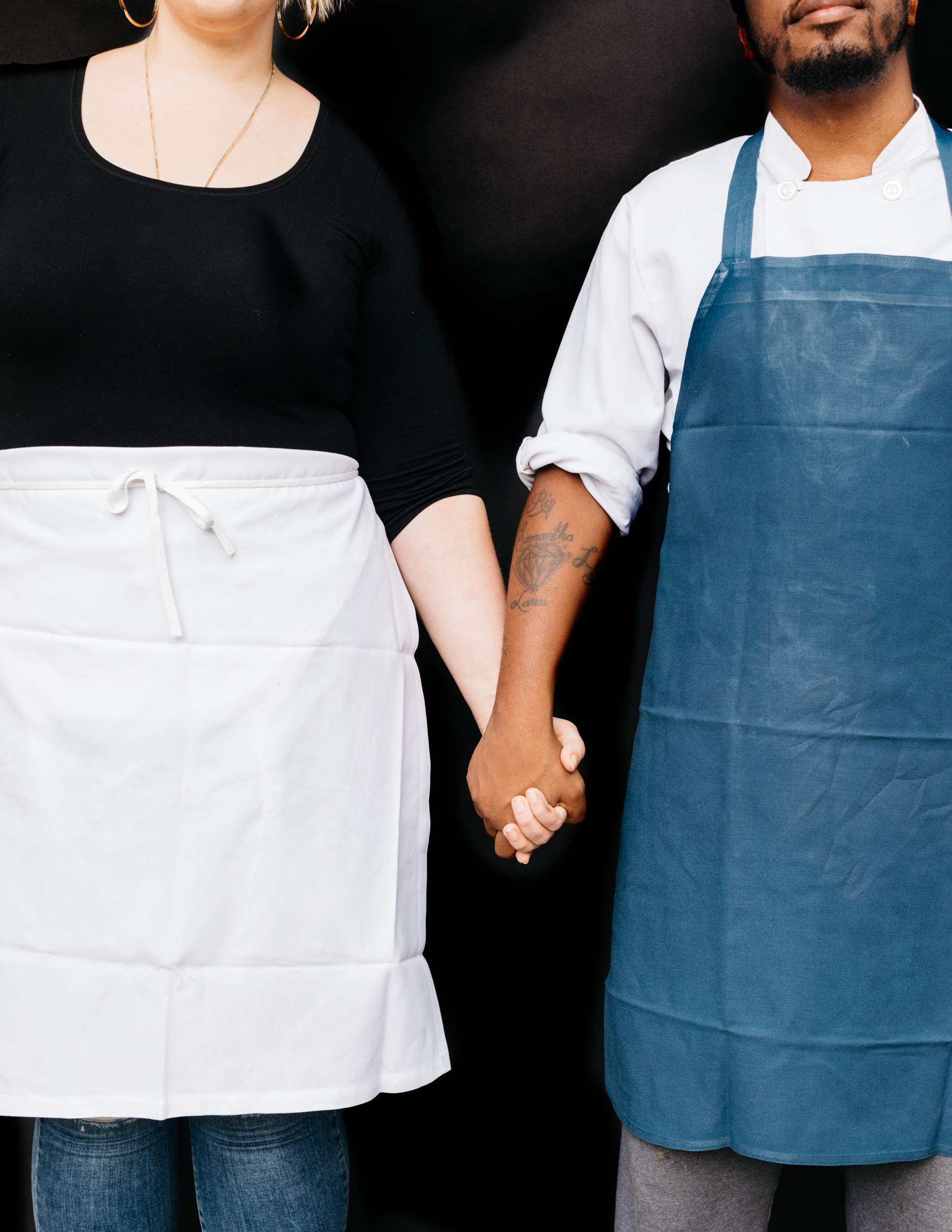Kitchen Transparent
Photos by Michael Piazza
ReThink Restaurants: Meet the Boston guys teaching restaurateurs to make more money by putting their people first.
Too many restaurateurs suck at business.
The numbers tell the story: Nearly two-thirds of new independent restaurants close before the end of their first year, according to a Cornell University study.
Partners Henry Patterson, Joe Grafton and Jack Ludden are on a mission to turn Massachusetts restaurateurs into businesspeople—profit-hungry fiends. One kitchen at a time, their company, ReThink Restaurants—with no office space and a staff of four—is transforming the way independent restaurant owners structure their businesses. What makes ReThink different from pretty much every other restaurant consulting company in America is that Patterson, Grafton and company work with the entire staff—from the dishwashers on up—teaching basic business and personal finance skills, looping them into annual goal-setting processes and ultimately making increasing profits everyone’s top priority. For employees, the best part of the “open-book management” philosophy ReThink preaches comes at the end of each quarter when, if their restaurant has met or exceeded its financial goals, they receive a check for a share of the profits.
Samantha Mangino took a job last summer at Juliet in Somerville working front-of-house. She says the culture she found at Juliet—built around the open-book model on which ReThink trained staff before it opened in 2016—transformed her work from a summer job and into a career.
“I would say [open-book management] creates an environment where everyone knows what’s happening, and everyone has the right to know what’s happening,” says Mangino, who began serving food at 14. “To that extent, I think everyone gets a say to a certain point, so we can all look at things and be, like, ‘OK, this number is off,’ or ‘this number looks a little funny’ or this number’s great! Can we do better?’”
Juliet is where Patterson and I catch up for breakfast on a sunny Friday. He’s a big, well-dressed guy, his hair and goatee speckled with gray. The lines on his tanned face tell of more than four decades in Boston’s food scene.
“When people first come to work in a restaurant,” he begins, “they think their job is to chop onions or wash dishes or serve. As they get more experienced they understand that making great food and drink is your job, but really your job is to create a great experience for your guests. What we’re saying is, ‘No, your job is to make this a great company that creates great experiences for your guests. Your responsibility is more like that of an owner, and your opportunity is more like that of an owner—you have a stake in the outcome.’”
Patterson didn’t always practice what he now preaches. He initially came to the Boston area in 1972 to attend graduate school at Harvard, studying intellectual and ethical development in adults. He spent a few years counseling Harvard College students before joining friends Elizabeth Carney and David Goldberg in opening a casual pizza restaurant near Harvard Square called Bel Canto in 1976. The restaurant took off like a rocket, winning nine Best of Boston awards and spreading to six locations in Greater Boston.
Patterson sold Bel Canto in 1991—his partners had left—and joined a company distributing coffee and tea to restaurants around Boston. The gig put Patterson in other people’s restaurants—many of them run by first-time restaurateurs—every day. Sometimes he felt more like a counselor than a consultant.
“I might be installing an espresso machine, and the owner would say, ‘What do you know about getting a liquor license in Quincy?’” he recalls. “And I’d say, ‘Sit down, let’s talk about that.’ It morphed for me to doing operator consulting.”
At a trade show in Las Vegas in 2013, a Chicago catering company owner, Kevin Walter, showed Patterson the open-book management model. Tasty Catering was in its fourth year of open-book management and had seen its profits increase from 3% to 18%—more than three times the national average. Walter showed Patterson a video of a “huddle” at Tasty Catering where the entire staff was being shown company revenues, profit and loss, cost of goods sold and other financial information that is traditionally kept from servers, cooks and dishwashers.
“It never occurred to me that everybody should understand the business financials,” says Patterson, who was moved by the revelation. “Once you see this stuff, you can’t unsee it.”
He knew restaurateurs in Boston who needed to see it, too. Lots of them. So, he began to devour anything he could get his hands on relating to this stakeholder model of running a restaurant, from Jack Stack’s Great Game of Business to testimonials from Ann Arbor institution Zingerman’s Delicatessen—believed to be the oldest food business in the country practicing open-book management.
The impetus for Patterson to finally build a curriculum for Boston-area restaurateurs would come a few months later when his phone rang while leaving a client’s restaurant in Cambridge. It was Brandon, a hardworking line cook he had had befriended over the years, and he was considering taking his own life after a string of financial misfortunes.
“I do the work of three people,” Brandon told Patterson, distraught. “Could I just get paid for two?”
Brandon’s story rings true for millions of American food workers. Restaurants employ nearly 3.75 million people making near-minimum wages, according to the Pew Research Center. Even those who earn more, some of whom cook and wash and serve in fine-dining establishments, find themselves in go-nowhere careers, working for owners who don’t value their input—let alone their development as a professional.
This defined the other kitchens where Noah Clickstein worked prior to coming to Juliet in the spring of 2017. The Culinary Institute of America–trained cook (he was promoted to chef this past summer) says he became sick of the kitchen status quo: lots of yelling and insulting, too little direction and certainly little in the way of financial incentive to do better. That is, until he read about a new little place in Somerville whose owners, Josh Lewin and Katrina Jazayeri, were taking a radically different approach to running a restaurant. For one, they’ve never allowed tipping and instead pay all employees a living wage. And they’d begun working with ReThink Restaurants to set up an open-book management system to both maximize profits and incentivize staff.
“The profit share really drew me in, having a restaurant that wanted to have everyone be a part of the daily operations and have a say—from the dishwashers to me,” Clickstein says, who says he saw how their performance impacted the team. “That food that you’re wasting, that affects my paycheck. That affects how much money I’m getting from profit share. That maybe changes the way you think about the way you work.”
When Clickstein came on board at Juliet, he joined ReThink’s training on open-book management, developed and facilitated by Joe Grafton—whom Patterson tapped early on to bring his ideas to fruition and make them accessible. “Henry is the why, and I’m the how,” Grafton says.
Grafton helped develop a course for restaurant leadership that delves things like personality traits, the quality of great teams, delegating, how to create a financial plan and even how to communicate nonviolently. The course track for staff covers topics like reputation management and revenue growth, basic financial literacy, cost of goods and labor in a restaurant and the elements of setting annual financial goals. Classes are also offered in Spanish, and Grafton says ReThink will soon launch a curriculum covering equity and justice in the workplace, co-developed with Irene Li of Mei Mei and inspired by the #MeToo movement. To Grafton’s knowledge, ReThink is the only company anywhere doing this kind of training in restaurants.
OK, but are eateries making more money?
Yes, and they’re sharing more, too. Paris Crèperie, ReThink’s inaugural open-book trainee, doubled its profits in a year, is on track to make record profits this year and has shared $130,000 in profits with its small staff since the beginning of 2015. Patterson says The Rail Trail Flatbread Co. in Hudson is “the most profitable restaurant I’ve ever seen,” consistently exceeding 20% in annual profits, which it shares with its more than 80 employees. And Juliet, which went through the training prior to opening in 2016, broke even in its first year of operation and was sharing profits with its staff of 15 by the first quarter of its second year, according to Lewin—who says he’s never regretted the restaurant’s people-first philosophy.
“Even if we’re wrong,” he adds, “we do not feel it’s right to take advantage of poor business practices or policies that forget the people involved in a business, even if it’s the way it’s always been done. The industry is way overdue for a change with respect to the dignity of people who are involved.”
This story appeared in the Fall 2018 issue.


